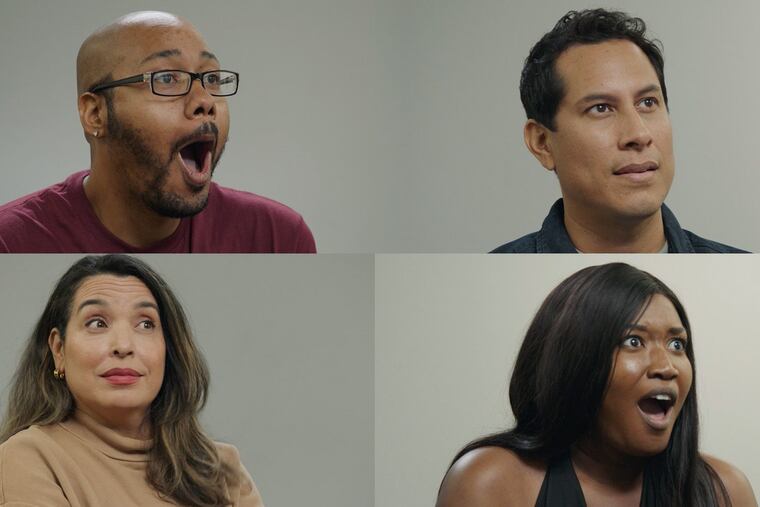Deepfakes meet cheesesteaks as Steak-umm rolls out a provocative marketing campaign
Vegans "say" that they love beef, and the trickery is the focus of an AI-awareness campaign by Steak-Umm.

The video shows a focus group. Six people, who identify as vegans, describe their reasons for living a plant-based life: “Honestly, I feel like being vegan is a pretty big part of my identity,” says one. “It shows that I’m a moral person,” says another. “I have a tattoo right here that says, ‘V for vegan,’” says a third.
Then they are served cheesesteaks, and the raves bubble forth: “I’ve missed meat so much.” “I could never go back to being a vegan.” “I might be addicted to meat at this point.”
Wait. Vegans eating beef and loving it? Did this happen?
Apparently so. They’re saying it, right there on the screen.
Steak-umm is using this video for a new ad campaign rolled out Oct. 31. But the West Chester-based food company is not using it to sell frozen steak slabs. It is sharing an entirely different message. It wants to demonstrate the sinister side of artificial intelligence.
The four-minute video of the “carnivorous” vegans is a deepfake.
Let’s start with the sandwiches. No vegans were harmed in the making of this video, said Max Scannapieco, Steak-umm’s vice president of sales and marketing. In fact, the focus group — convened by Tombras, Steak-umm’s ad agency — ate vegan cheesesteaks made of tofu, bell pepper, and vegan cheese, not Steak-umms.
The camera was rolling and the mics were on as the group raved about the plant-based sandwiches.
Then the video clips went through AI. Editors using off-the-shelf software digitally manipulated the comments to literally put different words in the tasters’ mouths: “I believe this world would be a better place if more people ate real meat.” “I truly believe that meat can heal the rift in this country.” “Eating meat is the most important thing in the world.” “I’m not ashamed to say sometimes I even daydream about different kinds of beef and pork.”
The panelists never said this.
The AI manipulation took 20 minutes, said Dooley Tombras, president of Tombras. The panelists were brought back and shown the altered version. Their reaction was jaw-dropping anguish: “That’s not what I said.” “That’s identity theft.” “Those words did not come out of my mouth.” “I’m telling you: That’s not my voice.”
A title comes on: “Imagine what a deepfake could make you say.”
Then the producers came clean. The panelists were told — to their great relief — that this exercise was to demonstrate how deepfake technology can impact everyday life.
“I’ve never heard of deepfake,” one panelist said. “Now, I’m questioning everything.” Another: “I thought of it like, ‘Oh, this is only a thing that people in the public eye have to worry about.’ Like I never consider the fact that my face could be used in a deepfake, and that’s pretty frightening.” “This could be life-threatening.” “Oh, they can get whatever they want out of you.” “So many people are quick to believe what they see off the bat without doing any research to where this can literally start wars.”
Viewers are asked to sign a petition to support the Deep Fakes Accountability Act. On Oct. 30, President Biden signed an executive order to create tighter standards for AI security and privacy.
Who would have guessed that a beef company is positioning itself as a steward of online transparency.
From the early days of the pandemic, Steak-umm has used its social media to debunk health claims. “When we got [into social media], we saw a really big issue with misinformation and disinformation and we thought we had a big opportunity,” Scannapieco said. “The Steak-umm brand is all about being 100% real beef. We wanted to be a strong advocate of debunking any type of misinformation or disinformation out there.”
friendly reminder in times of uncertainty and misinformation: anecdotes are not data. (good) data is carefully measured and collected information based on a range of subject-dependent factors, including, but not limited to, controlled variables, meta-analysis, and randomization
— Steak-umm (@steak_umm) April 7, 2020
“Since we’re 100% real, it gives us the right to go after anything that’s fake, right?” Scannapieco said. “When we saw deepfakes coming up this year, on the one hand, you might have thought, ‘Why has Steak-umm jumped into the deepfake discussion?’ But on the other hand, this is the most natural thing in the world.”
Tombras said Steak-umm’s social-media presence is distinctive because of “the irony and the tension of the fact that it’s a frozen meat company getting real with consumers about real politics that’s unexpected.”
“Our hope is that this strikes a chord in our culture because it’s interesting and unexpected,” Tombras said.